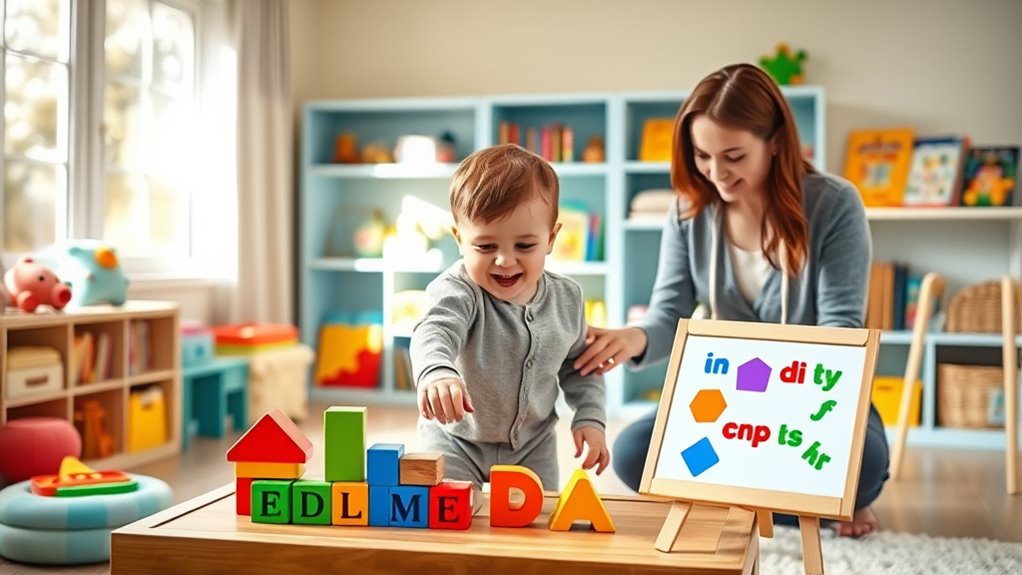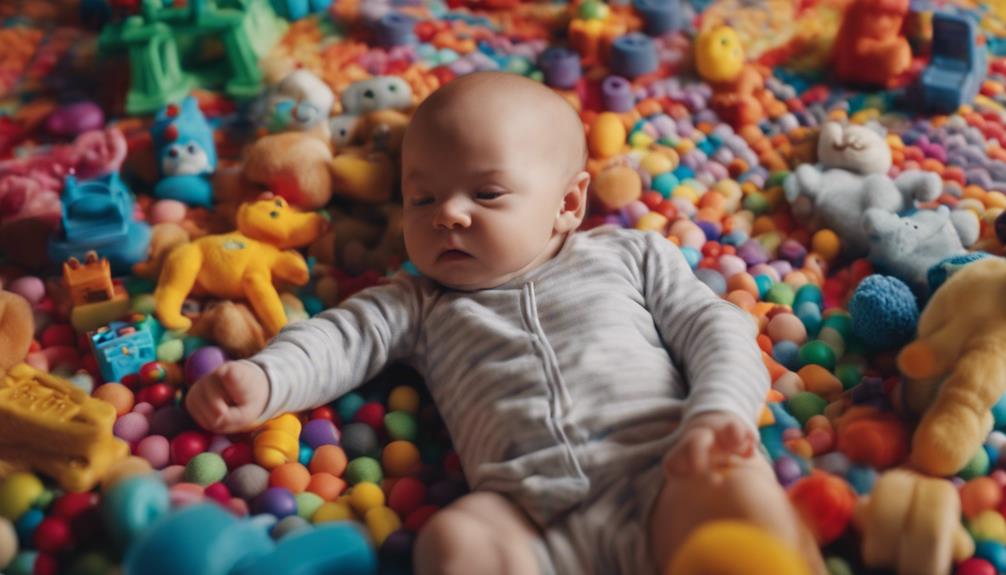You can boost your baby’s IQ by incorporating simple routines that combine sensory play and language moments into daily life. Talk and sing during diaper changes, describe objects as you explore them, and introduce textured toys during playtime. Use different smells and sounds to stimulate senses, making routines fun and engaging. These small activities foster curiosity and neural development naturally. Keep going, and you’ll discover even more ways to nurture your little one’s early learning journey.
Key Takeaways
- Incorporate short, frequent routines involving talking, singing, and exploring to stimulate language and sensory development.
- Use descriptive language and expressive gestures during daily activities to enhance early communication skills.
- Integrate textured toys, colorful visuals, and sounds into routines to boost sensory engagement and neural growth.
- Turn everyday moments like diaper changes and bath time into opportunities for sensory and language learning.
- Create a stimulating environment that encourages curiosity through consistent, playful interactions to support cognitive development.

Building Baby Einstein involves creating engaging, educational content that sparks curiosity and promotes early learning. When you design activities or routines for your little one, you’re laying the foundation for essential skills like language development and sensory stimulation. These early interactions are more than just fun; they’re indispensable for boosting your baby’s intelligence and overall growth. By intentionally incorporating elements that promote both hearing and sight, you help your child start to understand the world around them.
Creating engaging routines fosters early learning, boosting your baby’s intelligence through sensory and language development.
A great way to support language development is through regular, meaningful talk. When you describe what you’re doing, name objects, or sing simple songs, you’re giving your baby rich language experiences. These interactions help your little one recognize sounds, learn new words, and connect words with their meanings. Over time, this builds a solid vocabulary that’s fundamental for later communication skills and cognitive development. Keep in mind that your tone, facial expressions, and gestures add additional layers of communication, making language even more engaging and easier for your baby to absorb.
Sensory stimulation is equally important in building Baby Einstein. Babies learn about their environment primarily through their senses—sight, sound, touch, taste, and smell. You can enhance this learning by providing a variety of textured toys, colorful visuals, and gentle sounds. For example, soft fabrics, shiny objects, or musical toys captivate their attention and awaken their senses. When your baby touches different textures or hears diverse sounds, their brain forms new neural connections, which are essential for cognitive development and problem-solving skills. Incorporating sensory-rich experiences into daily routines—like playing with textured books during reading time or exploring new smells during snack time—can make learning more dynamic and enjoyable. Additionally, understanding the importance of contrast ratio can help you choose the best visuals or toys that stimulate your baby’s visual development effectively.
Consistency is key. As you integrate these routines, you’re not just entertaining your baby; you’re subtly boosting their IQ by reinforcing neural pathways that will support future learning. Short, frequent sessions of talking, singing, and sensory exploration fit naturally into your daily schedule. Whether it’s during diaper changes, bath time, or playtime, these moments become opportunities to stimulate your child’s developing brain. Remember, the goal isn’t to teach formal lessons but to create an environment where curiosity is encouraged and learning feels natural.
In essence, building Baby Einstein through daily routines that focus on language development and sensory stimulation sets the stage for your child’s intellectual growth. With your active involvement, you help foster an environment where curiosity thrives, and early learning becomes a joyful part of everyday life.
Frequently Asked Questions
How Early Should I Start Implementing These Routines?
You should start implementing these routines as early as possible, considering timing considerations and your child’s developmental milestones. The earlier you introduce engaging activities, the better, as your baby is constantly developing. Focus on age-appropriate interactions that stimulate their senses and curiosity. By aligning routines with these milestones, you support ideal growth. Remember, consistent, loving interactions create a strong foundation for lifelong learning and development.
Are There Specific Toys That Enhance IQ Development?
Ever wonder if certain toys can unlock your child’s potential? Yes, toy selection matters! Developmental toys that promote problem-solving, language, and sensory skills are especially effective. Look for toys that challenge their thinking, like shape sorters or musical instruments, rather than just distract. These toys serve as tiny sparks that ignite curiosity and learning, ultimately boosting IQ development. Choose wisely, and watch their mind grow!
Can These Routines Replace Traditional Educational Methods?
You might wonder if routines can replace traditional education, but they’re best used alongside it. Daily routines that promote brain development and involve you as a parent enhance learning, rather than replace classroom methods. Your active involvement helps reinforce skills and encourages curiosity, supporting your child’s growth. While routines are valuable, combining them with formal education offers a balanced approach to nurturing your child’s full potential.
How Do I Tailor Routines for Different Age Groups?
You should tailor routines by focusing on age-specific activities that align with each child’s developmental milestones. For infants, incorporate sensory play and simple language; for toddlers, encourage interactive storytelling and motor skills. As children grow, introduce more complex problem-solving and social interactions. Observing their responses helps you adjust activities, ensuring you support their unique developmental needs while fostering engagement and learning at every stage.
What Signs Indicate My Baby Is Benefiting From These Routines?
Think of your baby’s brain development as a garden blooming. Signs your routines are working include increased curiosity, better focus, and new skills like babbling or crawling. You’ll notice more engagement during activities and a joyful response to your interactions. These moments reflect your parental engagement nurturing their growth, helping their brain flourish. Keep observing these signs, as they show your routines are planting the seeds for lifelong learning.
Conclusion
By following these simple routines, you’ll turn your little one into a genius in the making—think of them as a tiny Einstein bursting with brainpower! With each moment you spend engaging, you’re revealing supercharged neural pathways, transforming everyday activities into secret brain-boosting adventures. Before you know it, your baby will be dazzling everyone with their incredible smarts, like a tiny prodigy wielding a genius-level IQ that could light up the universe!










